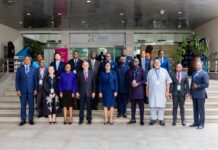By Lilian Museka
Nairobi, Kenya: Manufacturers have cited reducing costs and maintaining jobs as top priorities during the COVID-19 pandemic. This is according to findings of a KAM, KPMG report on the impact of Covid-19 on manufacturers in Kenya.
Despite fears of the impact of the pandemic on local industry, 81% of manufacturers say they are not likely to close down as a result of the impact of COVID-19. However, this number reduces to 76% for manufacturing SMEs.
From the survey, 78% of manufacturers’ top priority is reducing costs, 61% are keen on job retention with 53% giving precedence to improving cash flows. On employment, 40% of surveyed manufacturers have reduced their casual employees whereas 17% have reduced the permanent workforce. On the other hand, 91% of non-essential manufacturers have seen a significant decrease in demand for their products compared to 74% of essential goods manufacturers.
42% of manufacturers are operating at less than half of their operating capacity, whereas 37% of SMEs have scaled-down production. On the other hand, 79% of surveyed companies are experiencing cash flow constraints, with 86% of SMEs facing the same challenge, leading to difficulties in facing their financial obligations such as salaries and operational costs. To resolve cash flow challenges, manufacturers have negotiated payment plans with their suppliers (66%), customers (62%), banks (55%), and sought additional financial support from other individuals and institutions (45%).
On economic incentives, 71% of surveyed manufacturers indicated that zero tax on income less than Kshs 24,000 was the most helpful while reducing the VAT to 14% had the least benefits. The reduction of Corporate Tax from 30% to 25% was positively received by 60% of the surveyed manufacturers. 52% of manufacturers, to whom turnover tax (ToT) is applicable, found its reduction from 3% to 1% very helpful or helpful.
50% of manufacturers indicated that VAT refunds are helpful. However, the funds are yet to be disbursed to manufacturers.
To help businesses navigate the pandemic, the survey proposes clearing outstanding VAT refunds and pending bills, re-evaluating tax reliefs, providing moratorium on changes in the tax regime, establishing an emergency rescue fund, re-evaluating regulatory overreach, and developing a comprehensive rebound strategy among others.
Speaking during the launch of the report, KAM Chair Mr. Sachen Gudka noted that while it is important to have measures in place to curb the spread of the virus, the regulations coupled with uncertainty are likely to lead to a prolonged recession that will affect business continuity.
“It is important to assess the impact of COVID-19 on businesses so as to work with various partners and stakeholders, including the government to develop appropriate policies that will cushion the economy from the adverse effects of COVID-19 as well as minimize job losses. The report findings shall guide us as we engage the government in developing additional measures to further mitigate the adverse impact COVID-19 has had on businesses,” said Mr. Gudka.
KPMG CEO and Senior Partner Mr. Benson Ndung’u noted that the report has come at a critical moment because there is great optimism in the manufacturing sector and its role in job and wealth creation. “We applaud the government for their role in handling the health situation. Our focus now is saving livelihoods. We hope to have the economy start picking up again after this crisis. The report will inform the government on the impact of the stimulus package and where we can focus on to rebound the economy. The current crisis will end, and we shall come out stronger as a country.”
The impact of COVID-19 has also been felt by SMEs, who are more exposed to its effects, with start-ups being the most vulnerable. SMEs are currently facing more challenges in access to finance, greater cash flow constraints, and a bigger drop in demand and turnover. 30% have experienced a loss of between 65% – 100% with 49% reporting losses of between 30% – 64%.
The survey targeted manufacturers under the KAM Membership base and mainly focused on employment, business resilience, the impact of the economic stimulus package announced by H.E President Uhuru Kenyatta and proposals to further cushion the economy from the adverse effects of the pandemic.














